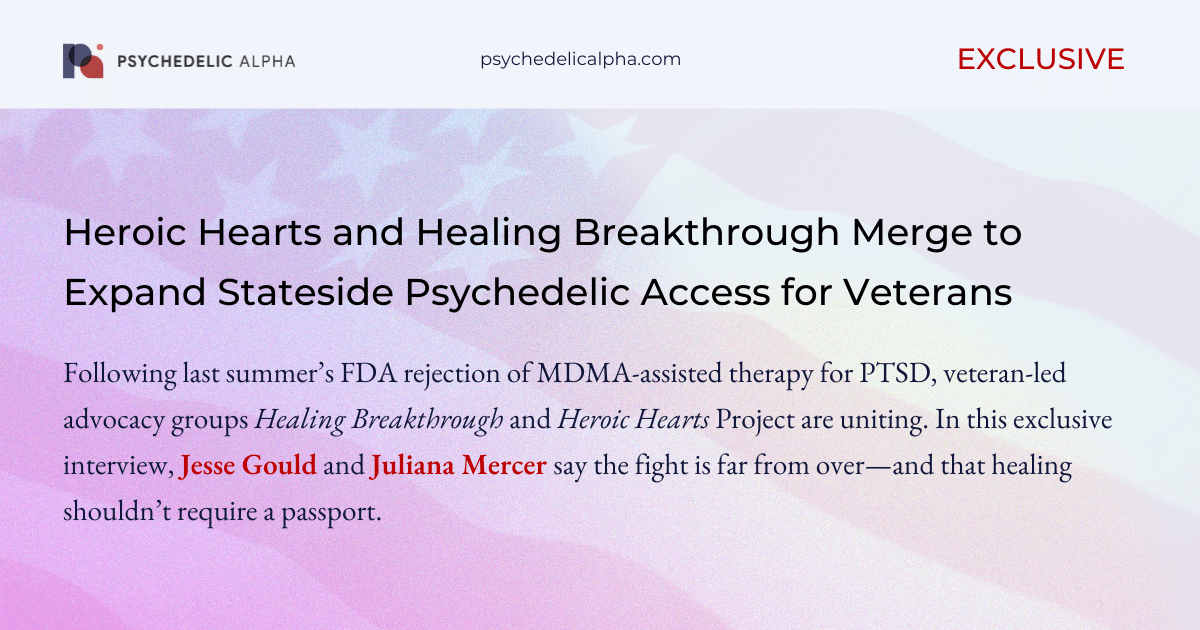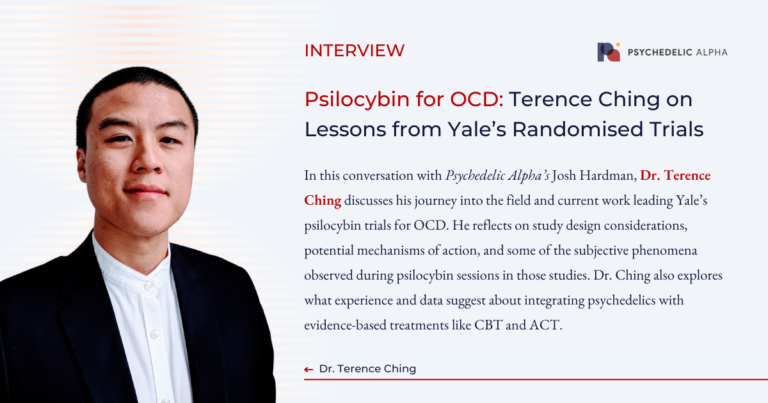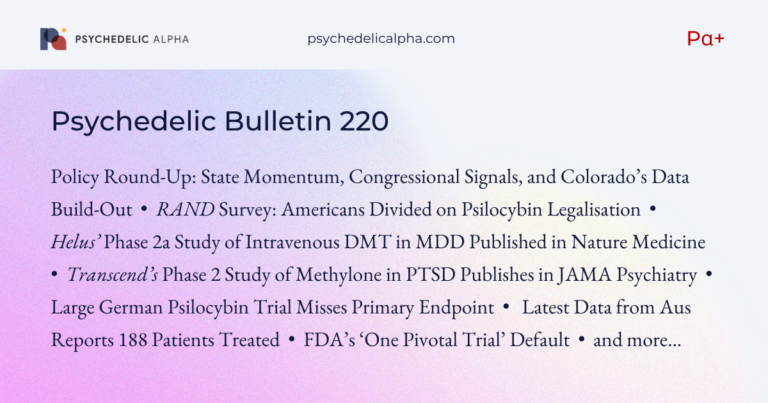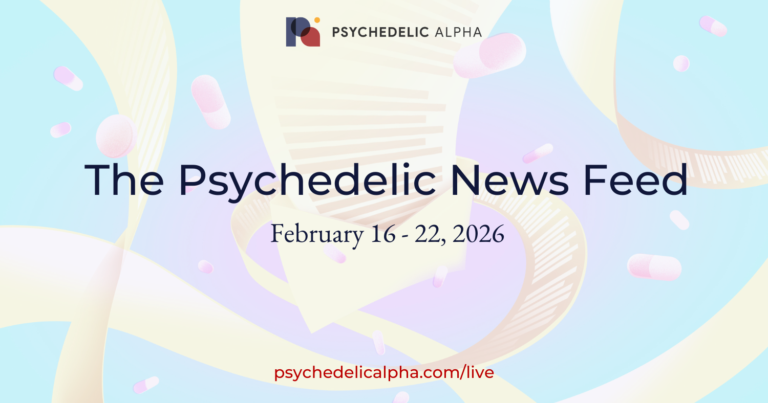Following last summer’s FDA rejection of MDMA-assisted therapy for PTSD, veteran-led advocacy groups Healing Breakthrough and Heroic Hearts Project are uniting. In this exclusive interview, Jesse Gould and Juliana Mercer say the fight is far from over—and that healing shouldn’t require a passport.
Two groups that have been pushing for veteran access to psychedelic-based care, Heroic Hearts Project (HHP) and Healing Breakthrough, are merging, with the latter to become a program within HHP.
Founded in 2017 by former Army Ranger Jesse Gould, Heroic Hearts Project is one of the earliest organisations focused on the goal of providing veterans with access to psychedelic care. Healing Breakthrough, meanwhile, emerged in the last few years with a much narrower goal of ensuring the VA was prepared for the potential roll-out of MDMA-assisted therapy. Juliana Mercer, its National Director of Veteran Advocacy and Policy, will now transition to Executive Director of the Healing Breakthrough program within HHP.
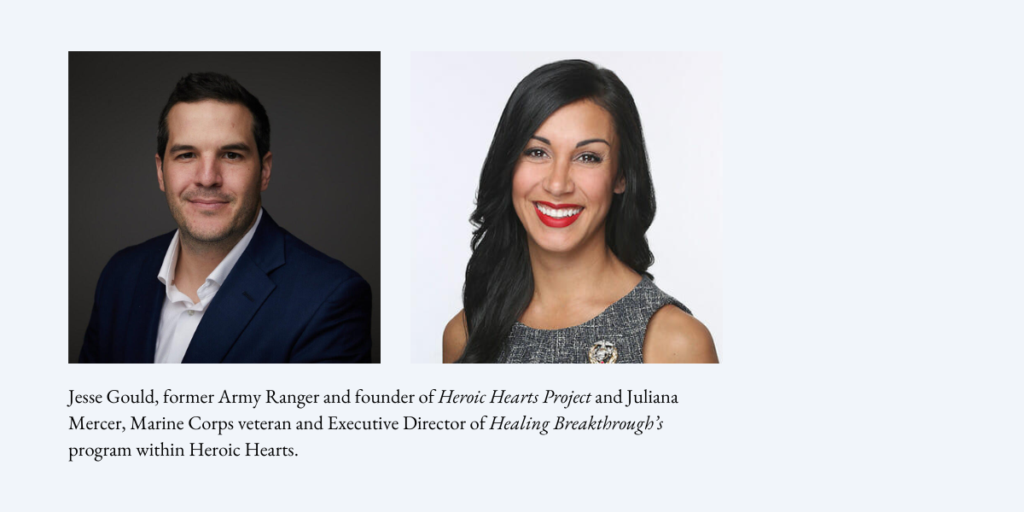
FDA Rejection Makes the Coalition Grow Stronger
We all know how the MDMA story developed last summer, with FDA ultimately rejecting Lykos Therapeutics’ MDMA for PTSD new drug application following months of very public criticism from bodies like ICER and an FDA advisory committee. That has since led Healing Breakthrough to broaden its focus to psychedelics more generally.
But that experience brought Mercer and Gould—and their respective organisations—closer together, they say, as the pair worked collaboratively on efforts to rally support among lawmakers when it became clear the agency was wavering over whether to anoint the application. On a hot and humid day last July, the two groups hosted a press conference in DC where they called on FDA to approve the investigational therapy.
Gould told us that he really saw the power of working collaboratively with Healing Breakthrough during that period. Indeed, veterans who had been to retreats abroad, including those programmed by his organisation, spoke passionately about why the agency should move to approve.
Mercer, meanwhile, pointed to the groups’ ability to muster dozens of signatures from lawmakers in support of Lykos’ application. One letter, sent to former President Joe Biden on August 2nd, just one week before the agency’s rejection, was signed by around 60 members of Congress.
The group also developed its party line during that period, urging the FDA to “follow the science.”
Indeed, Gould described that collaboration and mustering of support as a sort of “silver lining” of last summer. “It’s disappointing”, he told us, “but some things you can give it your all, but they’re just not meant to be in that time.” But it did show, he thinks, “how effective the veteran voices were”, suggesting their campaigning was a “proof of concept”. “Many veterans—at just a moment’s notice—wanted to go to DC and advocate, and they’re excited about it”, he continued, “they’re like: Who can I talk to next?!”
The pair remain positive, then, despite that setback. “We didn’t lose any momentum after the FDA decision,” Mercer said, “and actually were able to rally even more people to help support in this year”, pointing to appropriations requests in particular.
Mixed Messaging?
Some have suggested the groups’ campaigning last summer was confused by mixed messaging, questioning the decision to have retreat participants speak to psychedelic therapy’s potential in veterans as opposed to MDMA-assisted therapy trial participants, given the latter was the sole subject of FDA’s deliberation.
That confusion could also carry over to the present merger, which sees an organisation that was solely focused on FDA-approved, VA-delivered MDMA join forces with one that is focused on getting veterans access to psychedelics right here, right now, through retreats abroad and state-legal systems in the U.S.
But Mercer and Gould say it’s a simple, coherent message: Veterans are forced to go abroad, given the lack of FDA-approved options. “I think we can all agree that it’s outrageous that veterans have to leave the country to access these types of therapy”, Mercer told us, adding: “Veterans are going to continue leaving the country until there’s a solution like MDMA or psilocybin available to them here in the US, hopefully through the VA.”
Onshoring Psychedelics
Heroic Hearts Project, with Healing Breakthrough operating as a program within it, has a clear goal, then, of providing veterans with access to psychedelics on U.S. soil. As the Trump administration dreams of tariff-assisted onshoring of manufacturing and other key industries, Mercer and Gould appear to be pursuing a veteran-assisted onshoring of psychedelic-assisted care: both in the medical model through FDA-approved options at the VA, but also through state-legal systems like those in Oregon and Colorado.
“I don’t think our intention is to stop people from going abroad”, Mercer tells us. Rather, it’s “to create access for them here.”
Gould, whose organisation saw just shy of 70 veterans participate in its Oregon retreats last year, said that it’s not feasible to send thousands of veterans overseas, given the burden of logistics, time off work, and so on. He also pointed to questions around “exploitation of where these substances come from” and other cultural and ethical concerns.
While he said the group was honoured to work with the groups they do, “we need to figure out what the psychedelic culture in the US will look like.” That includes things like healthcare system integration and reimbursement, he said, to ensure “it’s not just a certain segment of society that can access MDMA or psilocybin.”
Oregon and Colorado, he says, represent something of a middle ground, “almost merging the retreat model and a more regulated model.” (While the group is engaging with state-legal models, it has no official stance on decriminalisation.) They also allow groups like Heroic Hearts to tinker with things like group therapy, community models, and peer support, which Gould says they lean heavily on. They’re also training some participants to become peer support facilitators or coaches following their experiences.
The nonprofit says that it works with University partners on research to track both adverse and positive outcomes, as well as community building and other things. He hopes that this work, done at retreats and in state-legal programs, will ultimately inform the rollout of VA psychedelic care, too.
The Retreat-to-Testimonial Pipeline
The pair also describe a sort of ‘retreat-to-testimonial pipeline’, whereby participants in Heroic Hearts’ programs go on to become advocates.
A lot of veterans who go on Heroic Hearts retreats, “want to have their voice be heard, want to advocate, because they found healing from it”, Gould told us.
Since he founded Heroic Hearts in 2017, he has noticed “a lot more veteran organisations popped up” (indeed, Mercer said it was one of her first questions when former Executive Director Jason Pyle approached her to join Healing Breakthrough: “Why are we starting another nonprofit?”), with many veterans now looking to bend the ears of lawmakers, which are already being bent in many directions, on this topic.
Gould says there’s a tendency toward consolidation as the space matures, and Mercer says there’s a need for coordinated messaging and a clear ‘ask’, given this proliferation of voices.
That ask, she says, is quite simple: “Enabling the VA to continue and to expand their research to large, multi-site trials, while we’re waiting for FDA approval.” She acknowledges, however, that this is “kind of a band-aid until approval”, meaning the trials would act as a conduit through which veterans could access psychedelic-assisted therapy in the interim.
Congress can help, Mercer says, by providing funding for that research, as well as for implementation. That won’t be new funding, she says, given the current political climate, but she is confident in the group’s work on “appropriating funding specifically for research.” In the case of FDA approval, the group would then lobby for appropriations to support roll-out. “We’re asking to make sure that there are line items in their existing budget that direct funding specifically for psychedelic-assisted therapy research”, she added.
The Politics of Veteran Access to Psychedelics
While the current political reality—which includes widespread cuts to the VA more generally—doesn’t appear propitious to fresh funds for psychedelics in the VA, Mercer pointed to excitement around RFK Jr. and Elon Musk’s positive pronouncements about psychedelics, but suggested the proof is in the pudding.
“Inevitably, people are getting excited”, she told us, adding, “that light at the end of the tunnel has gotten a little bit brighter for a lot of people, because this administration has quite a few folks in it that have spoken positively about it.” “But we need actions, not lip service,” she continued, “so we’ll see.”
Gould, meanwhile, emphasised the strong bipartisan support for this topic. “It’s so squarely bipartisan”, he told us. “People might disagree with whatever administration,” he continued, “but the message has really stayed—veteran lives are not a political issue.”
Given strong bipartisan support and prominent words of encouragement from within the new administration, might we expect MDMA to be FDA-approved this year?
Mercer doesn’t think so: “We’re already in May”, she noted.
Gould also thinks it’s a long shot. If the FDA requires Lykos to conduct another Phase 3 study, that is, of course, a multi-year project, “but that doesn’t mean other pathways are not possible”, he added. Still, he thinks it’s “very unlikely this year.”
A Delicate Balance
While veteran advocacy for psychedelic therapies has been credited as a major reason for some of the psychedelic movement’s successes, particularly in North America, the foregrounding of veterans has also drawn critiques.
There are many shades of that critique, but one of the most prominent charges is that psychedelics advocates and drug developers are exploiting veterans for their own ideological or commercial ends. Journalist Russell Hausfeld, for example, produced a series for Truthdig on the topic, and Jules Evans recently interviewed Jonathan Lubecky on this subject, among others.
Gould’s response is two-pronged.
The first takes aim at those levying the criticism, with the Heroic Hearts founder telling us: “Generally, the people that are attacking tend to be wanting to bring more awareness around what they’re doing.” He challenged those who hear such criticisms to consider the ‘agendas’ of those making them, and asked: “Are they attacking to take down, or are they attacking to be constructive?”
By that logic, both Heroic Hearts Projects and Healing Breakthrough might be prime targets for criticism, given they have attracted large sums of cash. In fact, the Psychedelic Science Funders Collaborative (PSFC) identified the two organisations as primary targets for veteran-related philanthropy in its Roadmap document, calling for $5M for HHP in the next three years and $7.5M for Healing Breakthrough.
The second line of rebuke points to a rich history of veteran activism and a claim that veterans are approaching Gould and Mercer and asking to tell their stories, as opposed to a contrived pipeline of veteran advocates originating from Heroic Hearts’ programs.
“From our standpoint, if you look at the history of Agent Orange, burn pits”, Gould said, “it’s always veterans going to DC because they’re the ones being affected, they want the voice.” “If they just go through the VA”, he continued, “it’s just sort of a door in the face any time we try to ask for more.”
Gould also outlined how the organisation handles testimonials, which he says “are never mandatory” or a condition of program participation. He also said that his organisation leaves “enough time for them to actually have space between the retreat, then we double check that they’re cool with [us sharing their testimonial].” Participants retain the right to revoke that permission at any point, he said.
“More often than not”, he continued, “they’re coming to us; people are reaching out to us every single day.” “It’s hard to say that we’re exploiting them when we’re helping them give a voice”, he added.
Mercer concurred. “I have to turn veterans down because there are so many that want to come and share their story and advocate”, she told us. “So it’s not us recruiting them to come for this evil agenda that we have”, she continued, “it’s them coming to us and wanting to help because their lives were saved, and they want to ensure that other veterans have access to these life-saving therapies.”
The pair hope that, with shared resources, they can provide more to those veterans who wish to speak to the government. “We’re trying to build a better pipeline”, Gould said, in which “not only does their travel get covered, but they get some guidance, some mental health support if they need it, and we make sure they’re actually good to go.” “At the end of the day, our concern is veterans”, he added.
“Who are we to say: No, you can’t speak; only Jesse or Juliana gets to speak in front of the camera”, Gould continued. “This can be an empowering thing, right?”
It’s a delicate balance, then: empowering veterans to tell their stories and advocate for greater access to therapies they believe will be impactful for their communities while not being exploitative, especially during the afterglow period following a positive psychedelic experience.
It’s also a delicate matter when it comes to including all veterans, as opposed to foregrounding more “sexy” (as Mercer described them, pointing to their prominence in movies and books) sub-groups like Navy SEALs. Heroic Hearts’ inclusiveness is what attracted Mercer, a Marine Corps veteran, to Gould’s project as a volunteer in California, she told us.
To celebrate their union, Heroic Hearts Project will host a Gala aboard the USS Hornet in Alameda, just across the bay from San Francisco, in November. ∎

